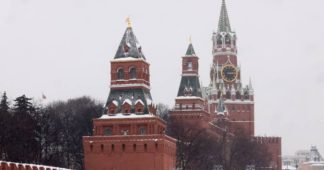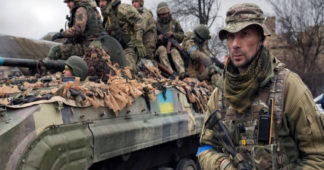At a white-tablecloth dinner on the second floor of an Italian bistro in Dupont Circle, two Ukrainian fighter pilots took a break from the battlefield to describe facing off with Russian jets above Kyiv to a rapt group of reporters.
The four journalists chimed in with questions. Do the Ukrainians really want MIGs, the outdated Soviet-designed fighter jets? What was their message for an American audience more concerned with high oil prices than Russian threats, one that might even blame gas prices on US support for Ukraine?
“Um, this is a tricky one,” an American PR executive interjected, “but answer carefully.”
“You tell me if it’s off the record,” one of the pilots said, to laughs.
“It’s just that Russia is a really big threat,” he continued. “If it’s not stopped right now, right here in Ukraine, on the ground, and with the sanction pressure, the rest of this democratic world could find themselves in a much, much worse situation.”
“Well said, bravo,” the PR executive said.
Ukraine has unleashed an incredible influence campaign in Washington. There’s a lag to the filing of lobbying disclosures. But even in the lead-up to the war last year, Ukraine’s lobbyists made more than 10,000 contacts with Congress, think tanks, and journalists. That’s higher than the well-funded lobbyists of Saudi Arabia, and experts on foreign lobbying told Vox they expect that this year’s number will grow much higher.
This spring, I’ve been invited to an elegant dinner with a parliamentary delegation and morning briefings (no breakfast, just coffee) at think tanks with Ukraine’s chief negotiator with Russia. Foreign policy reporters in DC have been inundated with requests. A journalist from another outlet, who asked for anonymity to be blunt, concurred: It’s been “a nonstop cycle” of Ukrainian visitors in Washington, they told me, “And think tanks that have basically become lobbyists but with a nonprofit status.”
Ukraine’s ambassador to Washington and other parliamentarians pop up at foreign policy events. Their express purpose has been amplifying support for bigger weapons packages for Ukraine. The requests are very specific and have evolved as the war goes on: Right now, Kyiv wants F-16s and drones, more artillery and armored vehicles. The messages conveyed by Ukrainian politicians and members of the armed forces are remarkably disciplined.
Visiting officials and meals with journalists are part of how Washington works, and there’s an ecosystem of experienced power brokers operating largely within — but sometimes in the gray zone — of US laws regulating foreign influence. And Ukraine, of course, is under siege and has mobilized its most eloquent advocates to speak with Washington influencers. But the sheer intensity and coordination of the effort reveal how Ukraine views the US as an active participant in the war, and at times pushes the legal boundaries around foreign lobbying.
In the case of the Italian dinner, a public affairs firm called Ridgely Walsh hosted and paid for the event and assembled the journalist guest list. The fighter pilots, who go by their call signs, Juice and Moonfish, to protect themselves and their families, had also met with members of the House and the Senate, the Department of Defense, and the Department of State. The two pilots were quoted widely in news media, and appeared on CNN alongside actor Sean Penn, before returning to their units the following Monday.
According to the Foreign Agent Registration Act (FARA), anyone working for a foreign entity must register, whether or not they’re being paid. Indeed, there’s been a major trend of PR and lobbying firms doing pro bono work for Ukrainians. In part because it is good PR.
Ridgely Walsh, according to Department of Justice filings, had not registered, and in response to Vox’s inquiry, the firm said it would change its status. “As a prudential matter, we’re gonna go ahead and register immediately to represent the Government of Ukraine on a pro bono basis,” Juleanna Glover, the founder and CEO of the firm, told me.
FARA is a peculiar law that requires voluntary disclosure, and it wasn’t all that well understood or enforced until the Trump era when some of then-President Donald Trump’s inner circle got caught without registering — Michael Flynn working for Turkey, Paul Manafort and Rick Gates lobbying for pro-Russia interests in Ukraine, and Tom Barrack allegedly acting as an unregistered agent of the United Arab Emirates.
“The very small group of FARA lawyers who have been doing this for a long time were shouting from the rooftops to everyone: beware,” Joshua Rosenstein, a lawyer at Sandler Reiff Lamb Rosenstein & Birkenstock, told me, “because FARA is more broad than you think.”
To understand the scale of Ukraine’s lobbying, it’s useful to review the history of a law that was meant to bring transparency to international activities at a time when, according to some metrics, there are more foreign agents registered than ever.
FARA: From obscurity to the front page
FARA was enacted in 1938 to combat Nazi propaganda and Soviet influence. It doesn’t regulate or censor speech as such, whether an individual represents the best of regimes or the worst of them.
It’s just registering and disclosing those interests, but any “informational materials” disseminated — like articles — must include a conspicuous statement of that work. The scholar Daniel Rice, who has registered to advise the Ukrainian president on a pro bono basis, is legally bound to add something like this to his articles: “This material is distributed by Daniel Rice on behalf of the Ukrainian Armed Forces. Additional information is available at the US Department of Justice, Washington, DC.”
The 50 years before 2016 saw only seven criminal prosecutions for FARA violations. But during the Trump years, the once-obscure area of law became a front-page story. “Before that, you know, we were probably a little naive,” says Virginia Canter, the chief ethics counsel of the nonprofit Citizens for Responsibility and Ethics in Washington. “You start seeing how foreign government interests and other foreign entities are trying to influence US policy.”
David Laufman is a partner at Wiggin and Dana who oversaw FARA enforcement at the Department of Justice from 2014 to 2018. “It quickly became apparent to me, by as early as early 2015, that we were not fully meeting our enforcement responsibilities under FARA,” he told me. “So I set about energizing enforcement of FARA, and it has built upon itself steadily since then.”
The Justice Department now is likely paying more attention to unfriendly governments and potentially unregistered lobbying, according to Rosenstein. “I would imagine that doing lobbying work, for example, on behalf of, say, a Chinese entity is given more scrutiny than lobbying work on behalf of a Canadian company,” he said.
The FARA unit has grown to five attorneys, five analysts, two support staffers, an intern, and an FBI agent detailed to it, but it still has “finite resources,” a Department of Justice official familiar with its workings, speaking on the condition of anonymity, told me. “Certainly, the scope of the potential national security threat is always going to drive our choices.”
It’s not yet clear what renewed enforcement of FARA will mean for the army of Ukrainian lobbyists in Washington, especially since the DOJ likely doesn’t see Ukraine as a “potential national security threat.” But the US government does have the power to make sure readers and viewers have clarity about foreign interests. “One of the beautiful things about FARA and how we run things is everything goes online. So you’re seeing what we’re seeing,” another DOJ official said.
How Ukraine lobbies
The number of firms registered to lobby on behalf of Ukrainian clients has exploded this summer. Six new firms registered in June alone, bringing the total to 24 firms or individuals now registered to lobby on behalf of Ukrainian clients, up from 11 registered to work for Ukraine last year.
Ben Freeman, a researcher at the nonpartisan Quincy Institute for Responsible Statecraft, says that current Ukrainian efforts rank among the most active foreign government lobby he has ever analyzed.
He is particularly surprised that major lobbying and comms shops in DC are giving their services away. “That’s just unheard of in the foreign lobbying space,” says Freeman, who authored the book The Foreign Policy Auction. “There’s no such thing as a free lobbyist in DC.”
That’s because there may be a business motive behind gratis lobbying.
Take, for example, Mercury Public Affairs, a prominent consulting and PR group based in Washington. It’s now doing pro bono work for GloBee International Agency for Regional Development for Ukraine. Prior to that, Mercury worked for Russian firms. In January of this year, Sovcombank, one of Russia’s largest banks, hired Mercury for $90,000 monthly in the hope of preventing new sanctions against it. On February 25, a day after Russia’s invasion, Mercury dropped Sovcombank as a client.
Qorvis, another powerhouse communications firm, is now working for Ukrainian aid relief groups after years representing Russian interests in Washington. “In a matter of months, they’re sort of switching sides on who they’re representing in this lobbying fight,” Freeman said.
Shai Franklin is a lobbyist at Your Global Strategy who worked closely with Ukrainian groups before the Russian invasion in February. He registered as a pro bono lobbyist for Ukraine and has been connecting Ukrainian mayors with American mayors, and has also been working for GloBee. “The first week I was doing the work, I realized I better file,” he told me. “And that brought its own publicity, which was great, because it shows that Washington people are standing up for Ukraine.”
The negative association with registering as a foreign agent has perhaps made some less interested in registering. The American Bar Association recently recommended changes to the law, including replacing the phrase “‘agent of a foreign principal’ with a term that elicits less stigma.” As Franklin put it, “I tell foreign clients that there’s no shame in filing under FARA, but some of them are still pretty spooked by it, because of what happened over the last few years, because FARA has been associated with a crime.”
Even working for those who seem like heroes requires registration. “When it comes to foreign governments lobbying or lobbying on behalf of foreign interests, people have to realize that whether it’s a foreign interest we see as a good guy or a bad guy or an ugly guy, that’s not the US interest,” said Freeman. There is a narrow humanitarian carveout that exempts some from registering, and those lobbying on behalf of foreign companies register under the Lobbying Disclosure Act.
The Ukrainians were savvy to send fighter pilots to a country that made the film Top Gun twice. Over risotto drizzled with asparagus puree and saffron fondue, they talked about flying low over the country on risky missions last month, making eye contact with Ukrainian farmers on tractors in the fields of grain and waving to agricultural producers who they see as also fighting on the front lines. But the purpose of their trip was not merely to raise awareness about the plight of Ukrainian farmers amid an emerging global food crisis.
“Our main goal is self-explanatory,” Moonfish said. “We’re meeting media and lawmakers in order to push the weapon flow to Ukraine.”
We remind our readers that publication of articles on our site does not mean that we agree with what is written. Our policy is to publish anything which we consider of interest, so as to assist our readers in forming their opinions. Sometimes we even publish articles with which we totally disagree, since we believe it is important for our readers to be informed on as wide a spectrum of views as possible.











